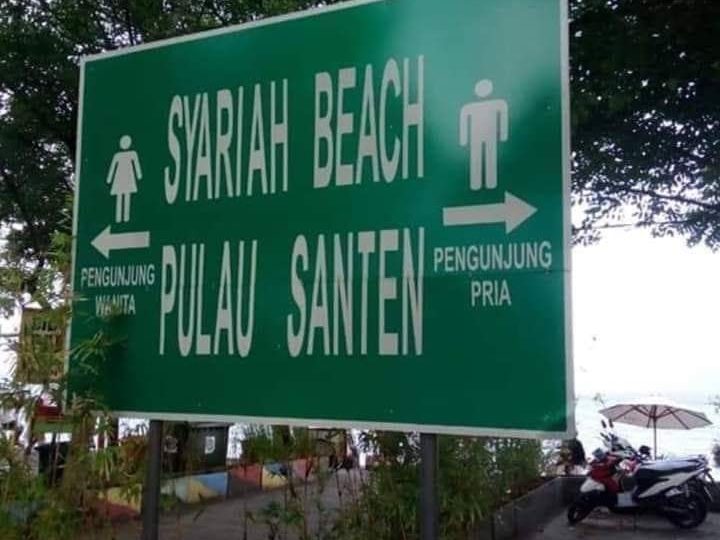While some conservative Indonesian culture warriors are concerned about the increasing “westernization” of Indonesian culture and social norms, those on the other end of the political spectrum often object to what they call the “Arabization” of Indonesia, particularly the implementation of government regulations based on strict interpretations of Islamic sharia law, similar to what might be found in Saudi Arabia.
A gender-segregated “sharia beach” in the Banyuwangi regency of East Java recently became the focus of such accusations after a Facebook post titled “In the Hindu Land of Banyuwangi, Arabization is forced to grow” went viral.
https://www.facebook.com/kajitow/posts/10211282917188438
The post, by user Kajitow Elkayeni, argues that the separation of the sexes at the Santen Island Sharia Beach was emblematic of a larger movement towards Arabization being pushed by Indonesia’s Minister of Tourism Arief Yahya, who hails from Banyuwangi, as well as Banyuwangi Regent Abdullah Azwar Anas, under the guise of “halal tourism”. Kajitow argues that Arabization goes further than halal tourism, which simply means providing for the needs of Muslim tourists such as having halal food and prayer spaces available.
Kajitow goes on to call this Arabization a form of oppression to Banyuwangi’s native Osing people, who were among the last Hindus in Java to resist both Dutch colonization and Islamification.
“Banyuwangi has succeeded in selling its Indonesianness for the sake of the Riyal and Dinar,” Kajitow wrote, referring to the currencies used in Saudi Arabia and several Middle Eastern countries.
Another post referring to Banyuwangi’s sharia beach, which got even more shares than Kajitow’s original, attacked the gender segregation policy in a different way — by making a joke connecting it to LGBT (a group that Indonesian conservatives are quick to classify as a moral danger to the country).
https://www.facebook.com/arie.elnashhara/posts/10214218250225620
The uproar over those social media posts was enough to get the Banyuwangi government to hold a press conference on Saturday to deny the accusations of Arabization.
“We have to share our commitment, we want to straighten out that this news is hoax, slander, Photoshop editing. And those who aren’t from Banyuwangi don’t know the real condition here. We are worried because this is a test for the Banyuwangi people. This is disturbing,” Banyuwangi Regency Tourism Head M.Y. Bramuda said during a press conference on Saturday as quoted by Merdeka.
(Bramuda’s mention of Photoshop likely referred to the LGBT post above, which, we agree, probably involved some editing.)
The press conference saw not only government officials deny the Arabization allegation but also several religious figures, including the chairman of the Banyuwangi branch of the Indonesian Ulema Council (MUI) and a representative of Parisada Hindu Dharma Indonesia (PHDI) Banyuwangi, which represents Osing Hindus living in the region.
In a second Facebook post on the subject, Kajitow responded to the criticism his first post got, including those from Hindu groups. He said that it was understandable that they would defend the policy since they want to protect their people and maintain a good relationship with the regent, but Kajitow argued that they were allowing for the creation of a slippery slope that would see the region inexorably drawn towards the adoption of more Arabic culture at the expense of local culture, like the proverbial frog in a pot of water who doesn’t notice the gradual increase in temperature until it’s too late.
https://www.facebook.com/kajitow/posts/10211299716688415
While observers point to a variety of reasons for the increasing conservativeness of attitudes towards Islam in Indonesia, many would argue that the cultural Arabization of the country is the direct result of a decades-long effort by Saudi Arabia to influence the development of Indonesian Islam through means such as donating money for the construction of mosques and Islamic universities spreading their theology as well as scholarships for Indonesians to study Islam in the Middle Eastern kingdom.




